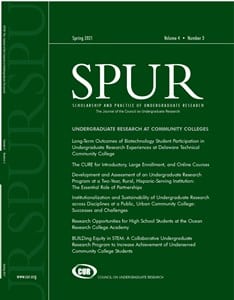SPUR (2021) 4 (3): https://doi.org/10.18833/spur/4/3/14
Increasing undergraduate research opportunities for introductory and non-STEM students benefits large numbers of students from diverse backgrounds. This article assesses a course-based undergraduate research experience (CURE) in a large, introductory course offered both online and in person at an open-door community college. Seated students collaborated during class, and online students collaborated asynchronously at the same pace over eight weeks. Changes in scientific literacy and attitudes toward science varied; seated students showed greater gains and rated their abilities higher upon completion of the CURE. Although online students did show gains, additional interventions improved their experience. This study demonstrates how reflective and iterative evaluation and improvement in CURE integration for introductory courses and non-STEM majors across delivery formats develops best practices for broadening participation in undergraduate research.
More Articles in this Issue
No posts found


